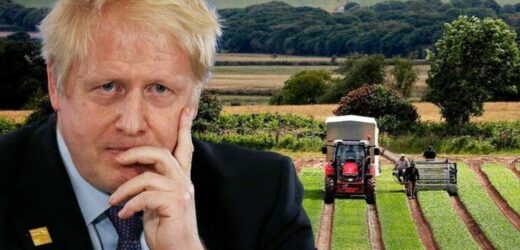British farmer discusses loss of milk profits in industry
We use your sign-up to provide content in ways you’ve consented to and to improve our understanding of you. This may include adverts from us and 3rd parties based on our understanding. You can unsubscribe at any time. More info
Since its departure from the EU, the UK has been in negotiations with countries around the world, signing new trade agreements. Most recently, Britain signed free trade agreements with Australia and New Zealand that removes nearly all tariffs between the UK and those two countries. It will also soon begin negotiations with Brazil over a trade deal that would likely involve a lot of produce, a key export for the South American country.
However, an expert has warned these trade agreements with countries that have much lower standards threaten British farmers’ livelihoods, as these imports will be far cheaper than can be grown at home.
Speaking to Express.co.uk, Josie Cohen, the Head of Policy and Campaigns at Pesticide Action Network UK, said: “Brexit has brought threats and opportunities in terms of UK pesticide standards.
“Before we left the EU, all of our pesticide standards came from Brussels.
“Now with the Brexit freedoms bill, the government is talking about systematically weakening the standards of the EU and getting rid of them, so that’s a real threat.


“The biggest threat to the UK around pesticide standards are around trade, in terms of trade deals with Brazil and the US that have much weaker standards
Ms Cohen warned that Brazil, which is a massive global exporter of agricultural products, have pesticide standards that are much weaker than those in the UK.
She added: “The Brazilian government would have a lot to gain if the UK weakened its domestic standards.
“There’s an issue in the UK itself around consumer health and consumer protection.

“UK pesticide standards are far from perfect, but they are much better than countries like Brazil.
“What that means is that you have farmers here who are not allowed to use certain chemicals here, like neonicotinoid, which are infamous of driving a decline in bee population.”
Ms Cohen recently co-wrote a report titled “Toxic trade UK” that reveals that the ongoing trade discussions between the UK and Brazil will likely lead to an increase in pesticide-related harms in both countries.
In this report, she also details the impacts these deals will have on British farmers’ livelihoods.
DON’T MISS:
Putin’s nuclear threat to UK: Nine locations that could be obliterated [MAPPED]
Scholz’s masterplan backfires! Putin sends gas reserves into freefall [ANALYSIS]
‘Who will save Europe?’ Russian space chief threatens to let ISS crash [REVEAL]

She said: “The UK Government is going out and striking deals with countries like Australia and New Zealand.
“Farmers in these countries are allowed to use these chemicals, and they’re able to use these produce foods at much lower environmental standards and much cheaply.
“They can export that to the UK and British farmers can’t compete.
“It’s completely hypocritical and unfair for the Government to be putting good standards in the UK, whilst allowing all these products in that’s been grown at lower standards.

“We know we can’t lower our standards because of the environmental impacts, so we need to make sure that our farmers are operating under these standards but aren’t being undercut but this massive flow of cheaper crops.”
Another important reason why the UK cannot lower its agricultural standards is that then would risk being left out of EU markets, that have a much stricter standard.
Ms Cohen noted 60-70 percent of the UK’s agricultural exports go to the EU.
She continued: “It’s a threat coming from both directions.”
Source: Read Full Article


